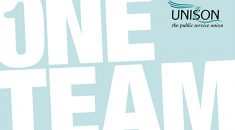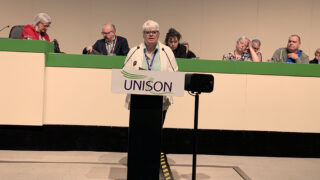Nurses, care assistants, cleaners and other NHS staff have suffered lewd sexual insults, groping and even rape while at work, according to research published by UNISON today (Thursday).
Being leered at or subjected to offensive ‘banter’ and suggestive gestures are regular occurrences for some of the nearly one in ten (8%) healthcare staff who reported being sexually harassed in the past year.
Verbal abuse (64%), such as unwanted remarks and jokes was the most common complaint, according to the report It’s Never Ok, released on the penultimate day of UNISON’s annual conference in Liverpool.
Nearly a quarter (22%) of the healthcare staff reporting harassment said they had been sexually assaulted. Some had also been the victim of criminal offences such as rape, up-skirting*, indecent exposure or inappropriate touching.
The findings in It’s Never Ok are taken from a much larger survey of 8,000 health workers and their experiences at work. It highlights the psychological trauma suffered by the 700 staff who responded to say they’d suffered sexual harassment in the past year.
Some have even contemplated suicide, self-harmed or been driven to either leave their job or look for another, which UNISON says adds to the ongoing NHS staffing crisis.
This shows the need for a tougher approach from government against employers who fail to tackle sexual harassment, says UNISON. It wants to see a change in the law so employers are also responsible for protecting their staff against harassment from for example patients or those working for contractors.*
It’s Never Ok reveals that the vast majority of those targeted were women (81%) and incidents mainly involved perpetrators who were older (61%) than their target, and often employed in more powerful roles (37%).
Acts of sexual harassment were most often committed by colleagues (54%). A quarter were committed by other workers (24%) and two fifths (42%) by patients.
Nearly a third (31%) who had been sexually harassed said it had occurred on a regular basis and more than one in ten (12%) weekly or daily.
The psychological impact can be devastating for some, according to It’s Never Ok. More than half (55%) ended up isolating themselves or avoiding colleagues/situations at work and more than a third (35%) said the harassment affected their mental health or confidence (34%). Others (40%) have ended up wanting to leave their job.
However, more than a quarter (28%) kept quiet about the harassment and only one in five (20%) reported it to human resources or their managers. Reasons for not reporting included the belief that nothing would be done (49%), they would be dismissed as oversensitive (37%) or the perpetrator would retaliate (24%).
Incidents described by survey respondents include: three reports of rape and one involving threats to rape; a team member upskirting a colleague then ‘accidentally’ sending the video to another member of staff; and an employee being sent nude images of colleagues via the online dating app Grindr.
Commenting on the report, UNISON assistant general secretary Christina McAnea said: “Staff should never have to face any kind of abuse, let alone sexually motivated insults and attacks.
“Many nurses, cleaners and administrative workers feel they have to put up with appalling behaviour as nothing will be done. This is generally because the perpetrators are in a position of power – or believe they are untouchable.
“The workplace which should be a harassment-free zone and employers who fail to act should be held to account.”
Jess Phillips MP, who sits on the Women and Equalities Select Committee, will be speaking at a fringe event at the UNISON conference in Liverpool later today, said: “The #metoo movement might have attracted a lot of attention but it doesn’t mean sexual harassment has gone away. It certainly hasn’t for women working in public services – far from it as this research shows.
“For too many women sexual harassment is deeply entrenched in workplace culture. It needs the government to take action so employers are called to account.”
Notes to editors:
– It’s Never Ok can be accessed here. Below are some of the experiences of survey respondents:
“One of my team upskirted a colleague then sent the video recording to another member in the team by ‘accident’.”
“A colleague touched my groin during handovers to ‘show’ where a patient had pain. The same person also touched around my side to ‘search’ for keys that I had in my pocket.”
“While I was on placement a patient attempted to take my tunic off, but none of the staff on the ward did anything.”
“I left the organisation. The nurse who made me feel uncomfortable made things awkward and I hated working on the same days as her.”
“As a result of my experience, I am now more wary about treating patients that are intoxicated or under the influence.”
“It was an incident that spooked me. I now purposely wear a larger uniform and feel myself tense up if we’re called to the area where the patient lives.”
– Hannah is a care worker from the South East. A male colleague she gets on well with would touch her arms and legs while they cared for patients. At first she thought it was accidental, as they sometimes have to be in close contact to assist patients. Then he started making comments about how attractive she was. She told him she wasn’t interested but he carried on and one day kissed her.
She reported him and he was reprimanded. Now the atmosphere is so cold when they work together she feels anxious and sometimes doesn’t want to go to work. The situation is so bad she’d rather lose money by changing shifts than be around him.
– Sally is a hospital administrative worker from the South West. She’s part of an all-male team and says she enjoys the banter with colleagues and can more than hold her own. But a regular visitor to her office has, over a number of months, made several inappropriate comments about her appearance and how much he’s attracted to her. She initially brushed off his comments but he recently asked her if she’d ever fancy a ‘one night stand or a quickie’. Although shocked and upset, she’s reluctant to report him because she doesn’t want her colleagues to think she’s weak.
– UNISON’s annual delegate conference is taking place from Tuesday 18 to Friday 21 June at the ACC in Liverpool.
– The survey for It’s Never Ok was carried out in May this year and received 8,487 responses from staff working in healthcare across the UK including nurses, paramedics, pharmacists, admin workers and cleaners. Of those responses 695 (8%) said they’d been sexually harassed in the past 12 months.
– Upskirting is a criminal offence that typically involves someone taking a picture under another person’s clothing without their knowledge. It is punishable by up to two years in prison.
– *In 2013 the government repealed section 40 of the Equality Act 2010. Before this, employers were liable if they had been made aware of three incidents of harassment but had failed to act. In 2018 the Court of Appeal ruled that third party harassment (by patients or contractors) was no longer covered by the Act. That’s why UNISON is campaigning for the reinstatement of section 40 of the 2010 Act.
Media contacts:
Liz Chinchen M: 07778 158175 E: l.chinchen@unison.co.uk
Anthony Barnes M: 07834 864794 E: a.barnes@unison.co.uk







